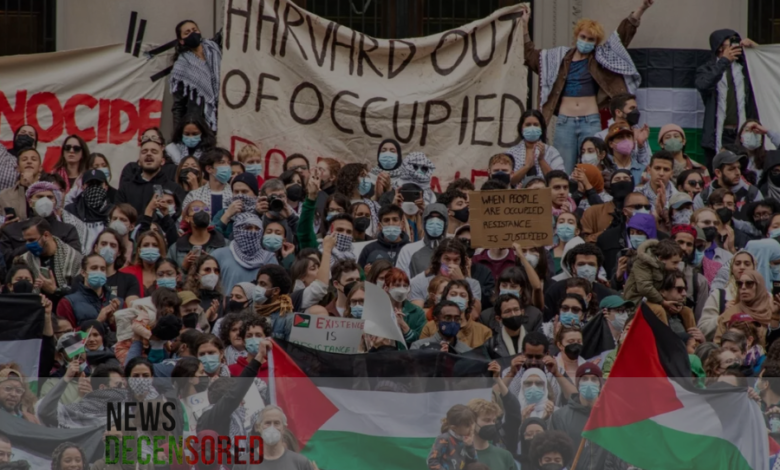Harvard Reverses the Suspensions of Five Pro-Palestine Students in the face of Campus Pressure

Student activists said that five students who were suspended from Harvard earlier in the year for their involvement in the pro-Palestine encampment have been reinstated after pressure from the campus community.
The university later told the students affected on Tuesday that their suspensions have been scaled down to probation. Furthermore, dozens of other students who participated in the encampment were also suspended; however, they were allowed to return to classes earlier than expected.
More than sixty students were subjected to disciplinary charges for their involvement in the 20-day encampment in Harvard Yard, April-May, where Harvard students, together with their counterparts from around the world, demanded that universities should reveal and resign from enterprises engaged in Israel’s occupation and recent wars.
When the faculty council, the leading faculty committee at Harvard’s Faculty of Arts and Sciences, ‘persists’ at something, the result usually is a kowtowing decision by the administration, such as the one disclosed on Monday – and behind the HOOP, the Harvard Out of Occupied Palestine Coalition that staged the encampment stands the faculty council.
“This reversal is a testament to our movement on campus and globally – more than 1,000 Commencement guests walked out to support the sanctioned colleagues; 45+ colleges’ organisations demanded no repression; and hundreds of faculty members denounced these calls; we made the administration backtrack on their unprecedented sanctions. ”
This happened when Harvard announced the appointment of Jennifer O’Connor, the vice president of technology and information law and policy at the defense firm Northrop Grumman, as Harvard’s new vice president and general counsel. Ms. O’Connor is a Harvard graduate and was recently the General Counsel for the U.S. Department of Defense. Reporting to The Harvard Gazette, O’Connor will assume the position of serving the Office of General Counsel in serving the University’s Schools, divisions, and other departments for many legal concerns.
When contacted for comment on lifting the suspensions, Harvard University’s press office declined to comment on individual disciplinary cases.
HOOP described Harvard’s decision to roll back the suspensions as the “bare minimum.” Their statement emphasized the contrast between the students’ situation and the ongoing devastation in Gaza.
“As many of us prepare to return to the university, we must remember that there are no universities left in Gaza,” the statement read. “Harvard continues to bankroll this annihilation of Palestinian life through its financial and political investments in genocide. Our movement for divestment must only grow stronger.”
Although disciplined students will be allowed to return to campus in the fall, with the harshest sanction now being one semester of probation, Harvard has yet to confer degrees upon the thirteen seniors prevented from graduating in May.
Harvard University, like many other institutions of higher learning in the U.S., has been a focal point for pro-Palestinian activism, especially in light of Israel’s recent actions in Gaza. Pro-Israel groups and billionaire donors have often equated criticism of Israel with antisemitism.
Pro-Palestine student protesters at Harvard have consistently argued that Palestine remains an exception to free speech on campus, highlighting the challenges faced by activists advocating for Palestinian rights.
As the new academic year approaches, the tension between free speech and institutional policies at Harvard will likely continue to be a significant issue, reflecting broader societal debates.




